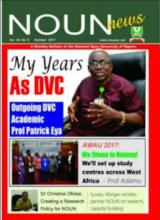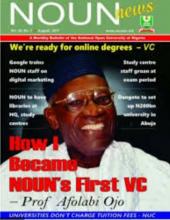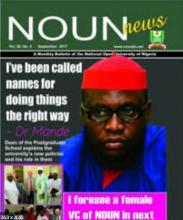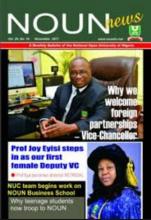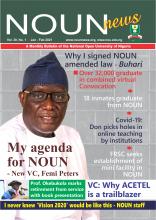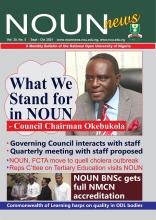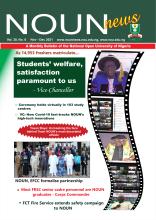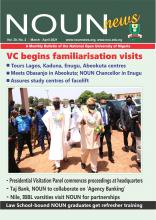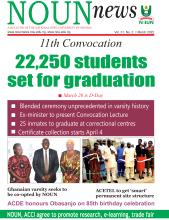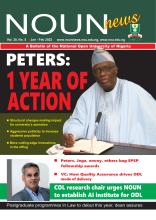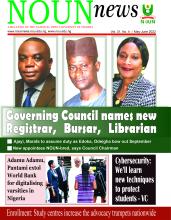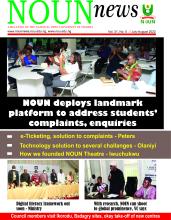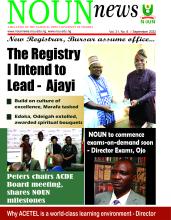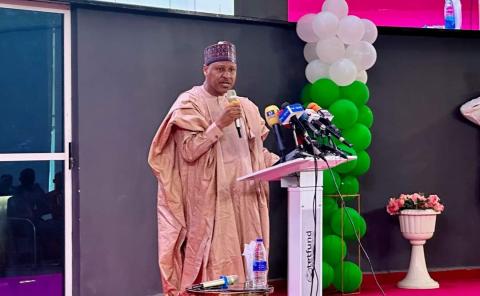
ADDRESS BY THE HONOURABLE MINISTER OF INFORMATION AND NATIONAL ORIENTATION, ALHAJI MOHAMMED IDRIS, fnipr, ON THE OCCASION OF THE CELEBRATION OF NATIONAL GLOBAL MEDIA AND INFORMATION LITERACY WEEK 2024, THEMED “NEW DIGITAL FRONTIERS OF INFORMATION: MEDIA AND INFORMATION LITERACY FOR PUBLIC INTEREST INFORMATION” ORGANISED BY THE INTERNATIONAL MEDIA AND INFORMATION LITERACY INSTITUTE (IMILI), NATIONAL OPEN UNIVERSITY OF NIGERIA, ABUJA, ON FRIDAY 25TH OCTOBER, 2024.
Protocols.
2.It is with great honour that I stand to address you at the symposium, jointly organized by the Federal Ministry of Information and National Orientation, the International Media and Information Literacy Institute under the National Open University of Nigeria, UNESCO Abuja Office and the National Commission for UNESCO (NATCOM UNESCO) to commemorate National Global Media and Information Literacy Week 2024.
3.As you may be aware, October 24th to 31st every year have been chosen by UNESCO to globally celebrate the Media and Information and Literacy Week, an implementation of a resolution of the 2021 United Nations General Assembly. The week seeks to raise awareness on the importance of Media and Information Literacy as essential skill to effectively navigate the media ecosystem and review the progress achieved in this regard.
4.This year’s National Global MIL week is particularly significant for not only because it is being hosted by the International Media and Information Literacy Institute (IMILI) of the Mass Communication Department of the National Open University of Nigeria, but it also signposts the modest progress we have made as a nation towards our march to improving MIL literate society.
5.This year’s global theme “New Digital Frontiers of Information: Media and Information Literacy for Public Interest Information,” and our national theme: “Empowering Nigerians through Digital Literacy: Navigating the New Media Frontiers for Inclusive Public Information” align with the thrust of Mr. President’s strategic communication objective of providing an effective and inclusive public information machinery that is accessible to all Nigerians irrespective of age, language, gender or other socio-economic factors.
6.This theme resonates deeply with the fourth pillar of the Ministry under my leadership which aims to modernize technology and talent in the Federal Government’s Information and Communications Systems. It’s in equipping the citizenry with the requisite knowledge and digital literacy skills that we can effectively communicate and collectively fight fake news, misinformation and disinformation
7.As we embrace the digital revolution, we must acknowledge its transformative impact on how information is created, shared, and consumed. The rise of social media, generative Artificial Intelligence (AI), online platforms and the new generation of digital content creators has democratized information flow, allowing voices from all corners of society to be heard. Literally, anyone with a laptop or an android phone has become a potential news creator, capable of reaching large number of people. However, this digital landscape with its limitless opportunities also poses serious challenges, especially with the spread of misinformation and disinformation, whether created by humans or generated by AI.
8.Therefore, it has become crucial that we empower our citizens with the tools they need to navigate this complex information environment, especially with the advent of Artificial Intelligence which will make it more complex. Media and Information Literacy (MIL) becomes essential in empowering individuals to critically assess, the information they encounter, discern credible sources, and engage responsibly with media content.
9.Media and Information Literacy enables us to cultivate critical thinking skills. It fosters an informed citizenry capable of making sound judgments in the face of conflicting narratives. By promoting MIL, we not only enhance public interest but also strengthen the fabric of our society.

10.As we recognize the importance of MIL, we must also commit to integrating it into our educational frameworks. It is imperative that our schools, universities, and community organizations prioritize media literacy programs, ensuring that our youth are equipped to thrive in this digital age.
11.It is therefore in recognition of the role of MIL as an enabler of inclusive public information dissemination that President Bola Ahmed Tinubu, GCFR, undertook to fulfil the commitment made by the previous administration when Nigeria hosted the 11th edition of the Global Media and Information Literacy Week Feature Conference in 2022 to establish a UNESCO International Media and Information Literacy Institute in Nigeria.
12.I am glad to announce that the Federal Ministry of Information and National Orientation, working with the Federal Ministry of Education and the National Open University of Nigeria, is inches closer to actualizing this goal. In the coming weeks, we are expecting a team of independent experts from UNESCO in Nigeria to assess the level of our preparedness and compliance to the institute becoming a UNESCO category 2 Institute. It is our conviction that given the level of commitment and interest shown by Mr. President and the entire team working on the project, we will succeed.
13.This institute, when it kicks off, will offer programs and courses that equip Nigerians, Africans, and people worldwide with requisite skills to understand the changing landscape of digital communication and how to navigate it safely.
14.We believe that by creating awareness and promoting education, we can empower our citizens to become discerning consumers and reliable content creators of information. This is not just a responsibility for the government but a collective effort that requires the engagement of all stakeholders.
15.As we reflect on our roles in this vital discourse, I urge all media professionals, educators, youth, civil society organizations, religious leaders, community leaders and other critical stakeholders to champion the cause of Media and Information Literacy. Together, let us create an environment where responsible media practices flourish and where the public is equipped to engage with information critically.
16.I also call on the new generation of content creators and social media influencers to prioritize the interests of the nation and uphold highest ethical standards in the expression and delivery of their crafts. Your role in ensuring accurate, fair, and responsible reporting and content is more important now than ever.
17.In conclusion, let us reaffirm our commitment to a free and responsible press, and to the promotion of Media and Information Literacy for all citizens. Together, we will navigate these new digital frontiers and build a society that values truth, transparency, and informed engagement.
18.I wish all participants a wonderful and enlightening session.
Thank you all for your attention.
- Log in to post comments
- 101 views

